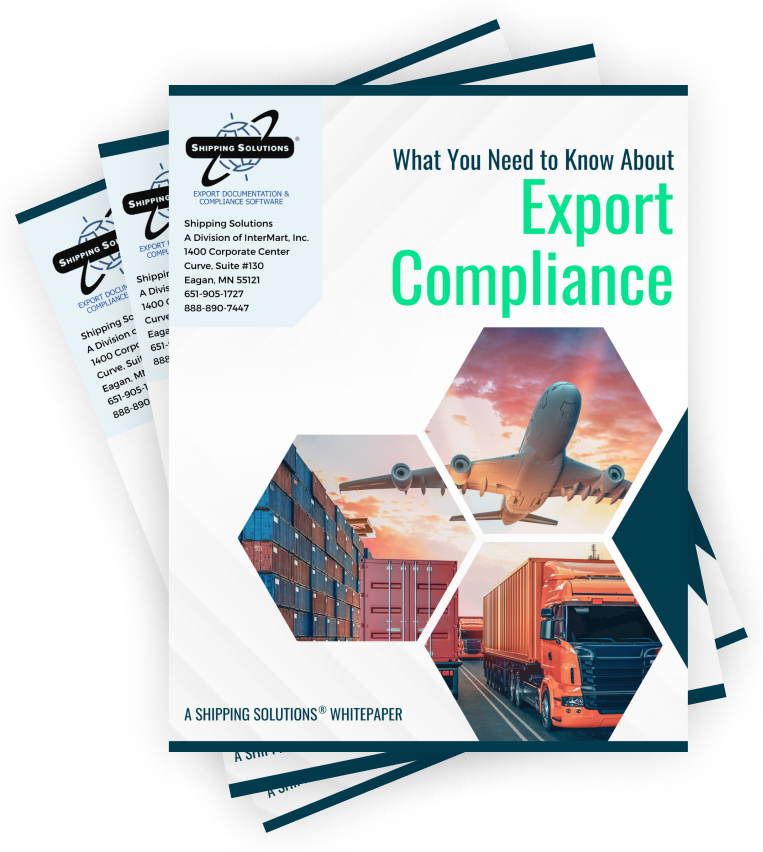The International Trade Blog Export Compliance
Working With a Third-Party Compliance Manager: What You Need to Know
On: July 10, 2023 | By:  David Noah |
5 min. read
David Noah |
5 min. read
 If you read our previous article, Hiring An Export Compliance Manager: What You Need To Know, you understand that increasing export regulations and sanctions, evolving economic powers (like Russia and China), and global instability have made the role of export compliance manager more important than ever. However, for some companies, hiring an in-house import-export compliance manager simply isn’t an option. Fortunately, that doesn’t mean your business is stuck DIYing export compliance.
If you read our previous article, Hiring An Export Compliance Manager: What You Need To Know, you understand that increasing export regulations and sanctions, evolving economic powers (like Russia and China), and global instability have made the role of export compliance manager more important than ever. However, for some companies, hiring an in-house import-export compliance manager simply isn’t an option. Fortunately, that doesn’t mean your business is stuck DIYing export compliance.
We spoke with Ellen Smith, founder and CEO of Amalie Trade Compliance Consulting, about the benefits of considering a third-party export compliance manager or partner and what companies should look for when evaluating potential partners. Smith has held a variety of roles — an attorney, in-house export compliance expert, and most recently the founder of her own trade compliance consultancy — that make her a fount of knowledge on this subject.
Do you need a third-party compliance manager?
Your company’s need for this role depends on the following:
- The types of products you export. Do they fall under the jurisdiction of the Commerce Department or State Department? Do they have an Export Commodity Control Number (ECCN) or are they EAR99?
- Where you do business in the world. There are fewer restrictions on exporting to Canada than China. Certain regions of the world are more prone to illegally diverting goods to sanctioned countries.
- If your industry is subject to export controls and sanctions, which have only increased for both ITAR-regulated and commercially regulated industries. (See above.)
- If your company has management personnel with expertise in regulations, export license application and due diligence screenings.
One important note: If you’re relying on a logistics and/or supply chain professional to manage compliance, you’re doing your company a disservice (and could face huge penalties and consequences because of it). While there is some overlap between compliance managers and logistics and supply chain roles, they are fundamentally different.
Third-Party Export Compliance Managers vs. In-House Export Compliance Managers: What’s the Difference?
Once you’ve decided you need an export compliance manager, learn the differences between in-house export compliance managers and third-party managers and evaluate which one might be better for your company.
Third-party compliance managers, sometimes called fractional trade compliance officers or managers, have all of the background knowledge and experience an in-house compliance manager would. However, they are available for hire on a fractional basis, which is a better fit for companies that either can’t afford or don’t need a full-time, 40-hour-per-week employee managing their export compliance. In some cases, third parties can be even more valuable than a single hire role, because you gain the perspective of multiple experts through the consultant/third party. Financially, many companies find it easier to hire a consultant than to raise the headcount with an internal hire.
For some companies, hiring internally may be a better option if they have a complex product that requires a full-time hire; it may also be better to hire internally if you can’t find the right consultant to fit your needs and who can act as an extension of your team.
Roles, Responsibilities and What to Look For
Third-party export compliance managers, also referred to in this article as consultants, provide operational advice and program or project management regarding export compliance in its various forms, based on the needs of the client company. Consultants act in the background as experts on export regulations. As needed, they provide regulatory advice, help create programs, assist program managers, and train teams in newly created or implemented processes and procedures.
What to Look for When Hiring
The trade compliance consultant you hire will work with your chief compliance officer and compliance team or supply chain leader (part of logistics and procurement), or a combination of the two.
When vetting potential partners:
- Focus on their expertise by stating the problems you’re trying to solve specifically and asking whether or not they have the expertise to solve those problems. The best way to figure this out, according to Smith, is to network. Established, successful consultants will know other people. Ask for references and information from outside counsel, your competitors and companies you’ve worked with in the past.
- Look for someone with recent experience. Some consultancies have experience, but that experience is from 30 years ago. In a world of ever-changing regulations and sanctions, you need a partner who has recent experience, understands how your company works, and can give practical advice on how to handle your specific compliance-related issues. This person should continuously follow and be up to date with regulations and recent geopolitical news.
- Look for specialization. According to Smith, you don’t want a third-party compliance manager who can do “all the things”—you want a partner who is the best at what they do specifically. Be careful about bringing on partners who can do it all—they may not necessarily do it all well.
- Consider the consultant’s network. What are the consultant’s interactions with government agencies? Are they well-networked within the U.S. government and other companies? Is that important to you? If so, you should ask specifically about this. This person should know how to work directly with applicable government authorities, including the Commerce and State Departments, through direct interactions, phone calls, emails, etc.
When is it time to hire a consultant as your export compliance manager?
Smith says there are a few common scenarios that might indicate when it’s pertinent to begin the hiring process for an export compliance manager:
1. You have a compliance issue and need resources.
From investigation support to project management support, consultants can step in when a situation has occurred to help your company assess the damage, course correct and avoid future issues. Even if you’re not quite to that point but the environment is risky, you need someone in a compliance role—if not internally, consider hiring a consultant.
2. You aren’t facing violations or warnings, but you know you have risk.
If you don’t have the right resources internally but you know you have risk, it’s time to hire a consultant who can provide practical advice to help you address it. Many industries are facing increased restrictions, regulations and sanctions, so if you’re feeling like it might be time to investigate consultants, it probably is. Your trade compliance function should include a program with policies and procedures, training, an annual risk assessment, auditing and systems. If it doesn't, hire a consultant to help get those things in place.
3. Your team tells you they need assistance.
If members of the compliance department or supply and logistics tell you they’re dealing with situations and compliance issues that are over their heads, you need to pay attention and do something. Regulations are incredibly complex, and you need an internal specialist or outside councel you can rely on to help mitigate risk and avoid potential penalties, fines and even jail time.
Final Advice from an Export Compliance Expert
Make sure you’re bringing in a consultant who offers practical advice.
Look for someone who can tailor what they do to what your company needs instead of taking something “off the shelf” and applying it to your company. All programs and trade compliance advice and systems need to be tailored to a specific company’s needs. Evaluate your consultant on how well they do this, and make a change if necessary.
Thank you to Ellen Smith, President of Amalie Trade Compliance Consultants, for her expertise in this article.
Like what you read? Join thousands of exporters and importers who subscribe to Passages: The International Trade Blog. You'll get the latest news and tips for exporters and importers delivered right to your inbox.

About the Author: David Noah
As president of Shipping Solutions, I've helped thousands of exporters more efficiently create accurate export documents and stay compliant with import-export regulations. Our Shipping Solutions software eliminates redundant data entry, which allows you to create your export paperwork up to five-times faster than using templates and reduces the chances of making the types of errors that could slow down your shipments and make it more difficult to get paid. I frequently write and speak on export documentation, regulations and compliance issues.


